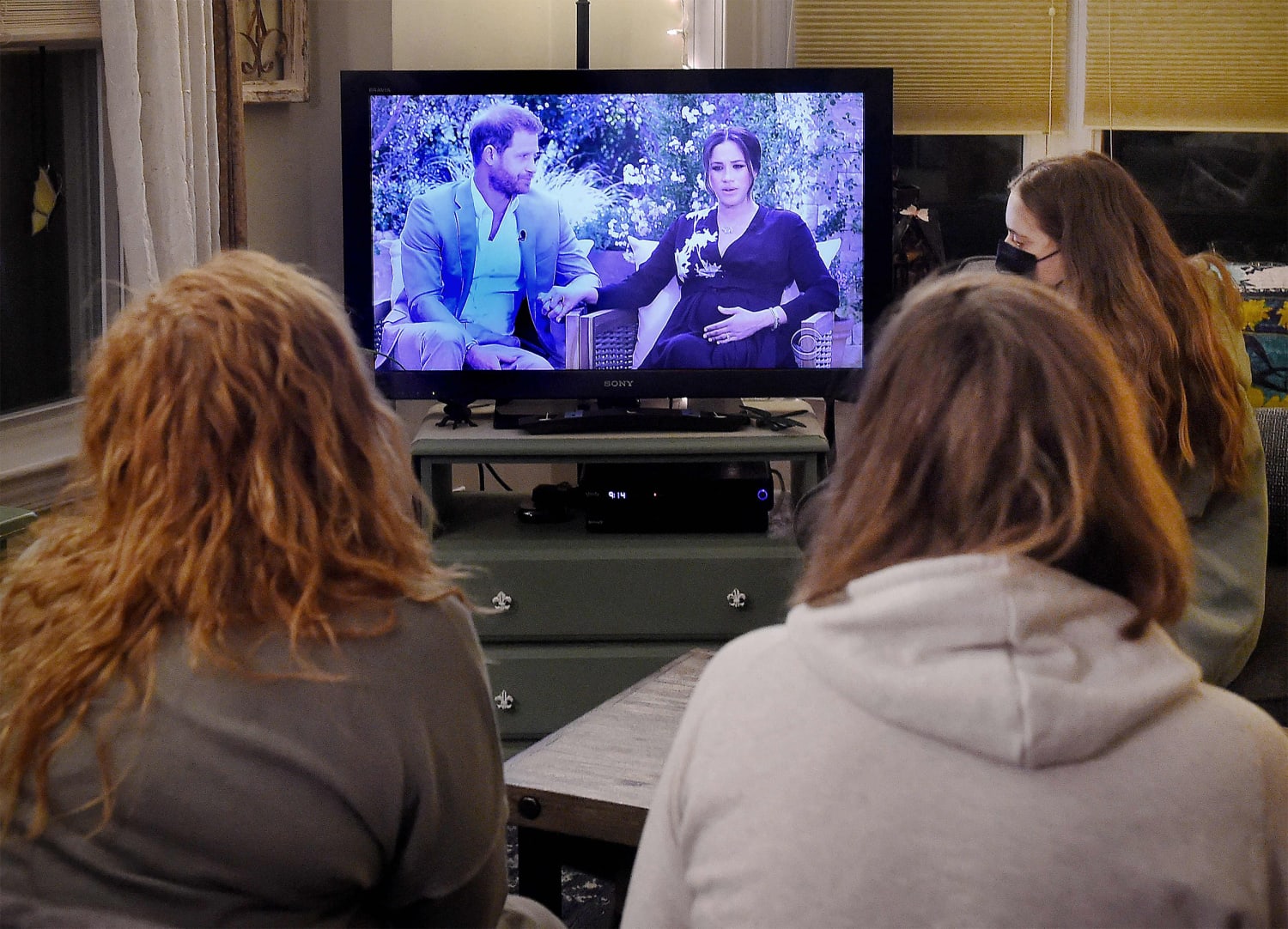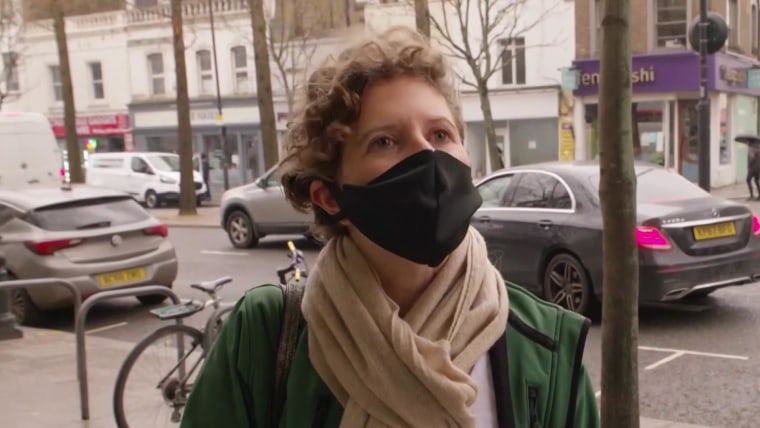LONDON — The explosive interview given by Prince Harry and his wife, Meghan, gripped millions of viewers in the United States and the United Kingdom alike this month.
Touching on mental health, race, finances and the couple’s public family fallout, the blockbuster program has created an ongoing media frenzy of intrigue over what goes on behind palace walls.
But the reactions to the interview have revealed another divide: distinct cultural sensibilities on both sides of the Atlantic.
While the self-exiled royals received mostly favorable press coverage and social media commentary in America, in Britain, the couple’s confessions were met with more than a dollop of disapproval.
Some U.K. tabloids branded the pair “selfish,” “nauseating” and said the interview was harmful to the queen, as they derided the Duke and Duchess of Sussex for going against the traditional British “stiff upper lip” stance to expose personal family matters to the American media mogul Oprah Winfrey.
In doing so, the argument goes, they reduced the more than 1,000-year-old institution of the monarchy to celebrity talk show fodder.
“This interview has removed all remaining sympathy I had for the couple,” Mark Graham, 52, an educational trainer from Cambridgeshire in eastern England told NBC News.
“I thought it was very staged and calculated. Most definitely one-sided and targeted.”
Far from damaging the monarchy, Graham said, the “sorry affair” had only reinforced the royal family’s standing and popularity in Britain.
For Pauline Farren, 50, originally from London but now living in Ireland, her sympathies also lie with Queen Elizabeth II and other royals.
“I was disgusted with them. I dislike Meghan intensely and feel sorry for Harry,” she said. “It was extremely classless to air their dirty linen in public after all the royal family have done for them.”
The timing was also provocative, she added.
“Prince Philip is very ill in hospital and the timing couldn’t have been worse, we are in the middle of a pandemic,” she said. “They look like spoiled, ungrateful millionaires.”
Philip, 99, was discharged from a London hospital Tuesday, returning to Windsor Castle after a month of treatment for an unspecified infection and a pre-existing heart condition.
An opinion poll by YouGov published after the interview found it had hurt the popularity of the two royals, with 48 percent of Britons now viewing Harry negatively — a drop of 15 points since the start of March. It also marked the first time approval had dipped into negative territory for the prince.
Meghan fared worse: only 3 in 10 people in the U.K. now hold a positive opinion of her, the poll found.
Across the pond, however, it was seemingly another story.
“The first thought I had, watching Meghan Markle, was that she was so genuine. I was immediately struck by her clarity, and that she was telling the absolute truth about her experiences,” said Chris Pluto, 44, a line cook at a restaurant in Pittsburgh.
Pluto said Meghan showed “courage” for speaking about her mental health, an approach that resonated and sparked empathy among many Americans.
“That made me cry. I felt that experience. I felt the honesty of what she was saying,” Pluto added.
The Duchess said during the interview that the pressure of royal life had, at times, left her feeling suicidal. “I just didn’t want to be alive anymore,” she told Winfrey.
Download the NBC News app for breaking news and politics
Former first lady Michelle Obama, singer Beyoncé and White House press secretary Jen Psaki were among the Americans to applaud Meghan for speaking openly about race and mental health.
“It seems to me that the U.S. is far more open to discussing important issues relating to mental health and racism. Britain has a tendency to look the other way,” British author and Meghan biographer Sean Smith said.
“Over here in the U.K., we spent far too much time discussing the hurt feelings of TV host Piers Morgan,” he added.
Morgan said on-air that he doubted some of Meghan’s comments and later quit hosting a morning show to “spend more time with my opinions,” he tweeted. Britain’s broadcasting regulator Ofcom has received more than 57,000 complaints from the public about his comments, so far.
For Brittney Watters, 31, a communications manager for the Fresno Unified School District in California, the royal interview “was so relatable.”
“What Meghan Markle was talking about has happened to me. I’m not a celebrity. I’m an everyday, middle class working person,” she said.
“I’ve experienced racism, oppression. I’ve experienced having thoughts of suicide, feeling exhausted and tired of my efforts as a Black woman — constantly trying to fight against the system.”
Meghan said that a royal insider had expressed “concerns” to Harry about how dark the skin of their children might be. The couple declined to name the individual, but Winfrey later said that Harry had made clear it was neither the queen nor Philip.
Reflecting its traditionally stoic attitude, Buckingham Palace issued a 61-word statement in response to the interview.
“The issues raised, particularly that of race, are concerning,” it said. “While some recollections may vary, they are taken very seriously and will be addressed by the family privately.”
Harry’s brother, Prince William, batted away the race allegations, telling reporters in London on March 11: “We’re very much not a racist family.”
But that only served to fuel the appetite of the press and the public in both countries for more on the family drama.
The queen’s standing among Britons, however, remains relatively undented, with 4 in 5 people liking her, according to the YouGov poll. William and his wife, Kate, also remain hugely popular — with about three-quarters of Britons giving them favorable reviews.
Londoner Adie Perkins said that following the royal revelations, he was sure the institution would “find a way of getting over it” as “there’s too much love for the monarchy,” but added that he found the interview “pretty shocking” and was left with little sympathy for Meghan and Harry.
Not all Britons are royalists.
An #abolishthemonarchy hashtag trended on Twitter after the interview, among those who support a republic.
For biographer Smith, little could or should change about the monarchy while Elizabeth II reigns, and attempts to pit transatlantic family members against one another are unhelpful.
“In my opinion, nothing will change while the queen is on the throne … she deserves respect,” he said.
“For me, that respect includes the media not weaponizing her as a sweet little granny against Meghan. They are both women of substance and deserve to be treated accordingly.”
If you or someone you know is in crisis, call the National Suicide Prevention Lifeline at 800-273-8255, text HOME to 741741 or visit SpeakingOfSuicide.com/resources for additional resources.
Source: | This article originally belongs to Nbcnews.com











